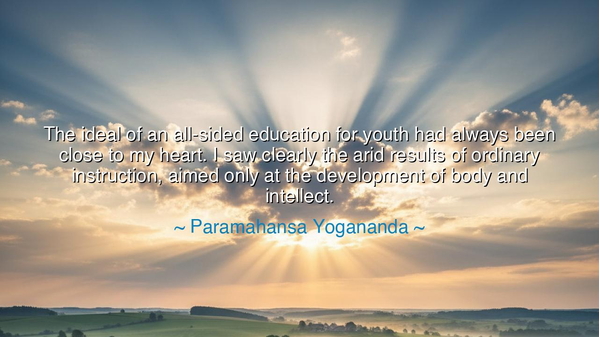
The ideal of an all-sided education for youth had always been
The ideal of an all-sided education for youth had always been close to my heart. I saw clearly the arid results of ordinary instruction, aimed only at the development of body and intellect.






The saintly teacher Paramahansa Yogananda, the bringer of India’s timeless wisdom to the modern West, once said: “The ideal of an all-sided education for youth had always been close to my heart. I saw clearly the arid results of ordinary instruction, aimed only at the development of body and intellect.” These words carry the fragrance of deep insight — for they arise from a soul who had seen both the might of reason and the emptiness that follows when man forgets his spirit. In Yogananda’s vision, education was not meant to produce clever minds alone, but awakened beings — strong in body, luminous in intellect, and anchored in divine consciousness.
When he speaks of “ordinary instruction,” Yogananda refers to the kind of education that focuses only on worldly success — knowledge of facts, skill in competition, and the cultivation of ambition. Such schooling, he saw, produces cleverness but not wisdom, prosperity without peace. The “arid results” he mentions are the barrenness of the soul that arises when a person knows everything about the outer world, yet nothing of their inner self. In his eyes, to educate the mind while neglecting the heart is to fashion a blade without a handle — sharp, but dangerous to the one who wields it.
In the ancient civilizations of both East and West, education was never divorced from morality or spirituality. The sages of India called it vidya, the illumination of the soul; and the Greeks called it paideia, the cultivation of virtue and intellect together. Both traditions understood that knowledge without character is ruin, and power without compassion is tyranny. Yogananda stood in this lineage of eternal teachers, crying out that the goal of learning must be wholeness — the all-sided development of body, mind, and spirit. Such education produces not mere professionals, but balanced human beings — noble in thought, creative in action, and pure in motive.
Yogananda himself lived this teaching. When he founded his “Schools of All-Round Education” in India, his students learned not only mathematics and literature, but meditation, self-discipline, service, and reverence for life. He taught that physical strength keeps the will steady, mental clarity opens the gates of understanding, and spiritual awareness reveals the unity of all beings. In his classrooms, the child was not a vessel to be filled with information, but a flame to be kindled — a living soul destined to express the divine in daily life.
History offers us many proofs of his vision. Consider Mahatma Gandhi, who built his philosophy not on intellectual argument alone, but on moral and spiritual education. His school in Sevagram trained the heart as much as the hand — weaving, cleaning, and prayer were as sacred as reading and writing. It was this all-sided education that gave India not merely freedom from political chains, but the strength to stand in truth and compassion amidst violence. The lesson is universal: nations may rise through science and technology, but they endure only through wisdom and virtue.
In our own age, Yogananda’s warning rings with even greater power. The world is filled with knowledge, yet empty of understanding. We can send machines to other planets, but struggle to find peace on our own. Our schools overflow with information, but our hearts starve for meaning. To heal this imbalance, we must return to his ideal — to nurture the intellect with reason, the body with discipline, and the spirit with love and meditation. Education must no longer aim to create specialists, but complete human beings.
The lesson, then, is clear and timeless: true education is the awakening of the whole being. It teaches not only how to live, but why to live. It fills the mind with truth, the hands with skill, and the heart with compassion. Every parent, every teacher, and every student must remember that learning is sacred only when it serves the higher purpose of self-realization — to see the divine within oneself and all creation.
So let Yogananda’s words echo in the hearts of all who guide the young: do not educate for ambition alone, but for harmony; not for power, but for peace. For knowledge divorced from wisdom dries the soul, but knowledge joined with spirit blooms eternally. The ideal of all-sided education is not a dream — it is the ancient path of wholeness, leading humanity from ignorance to illumination, from intellect to insight, and from self to Spirit.






AAdministratorAdministrator
Welcome, honored guests. Please leave a comment, we will respond soon